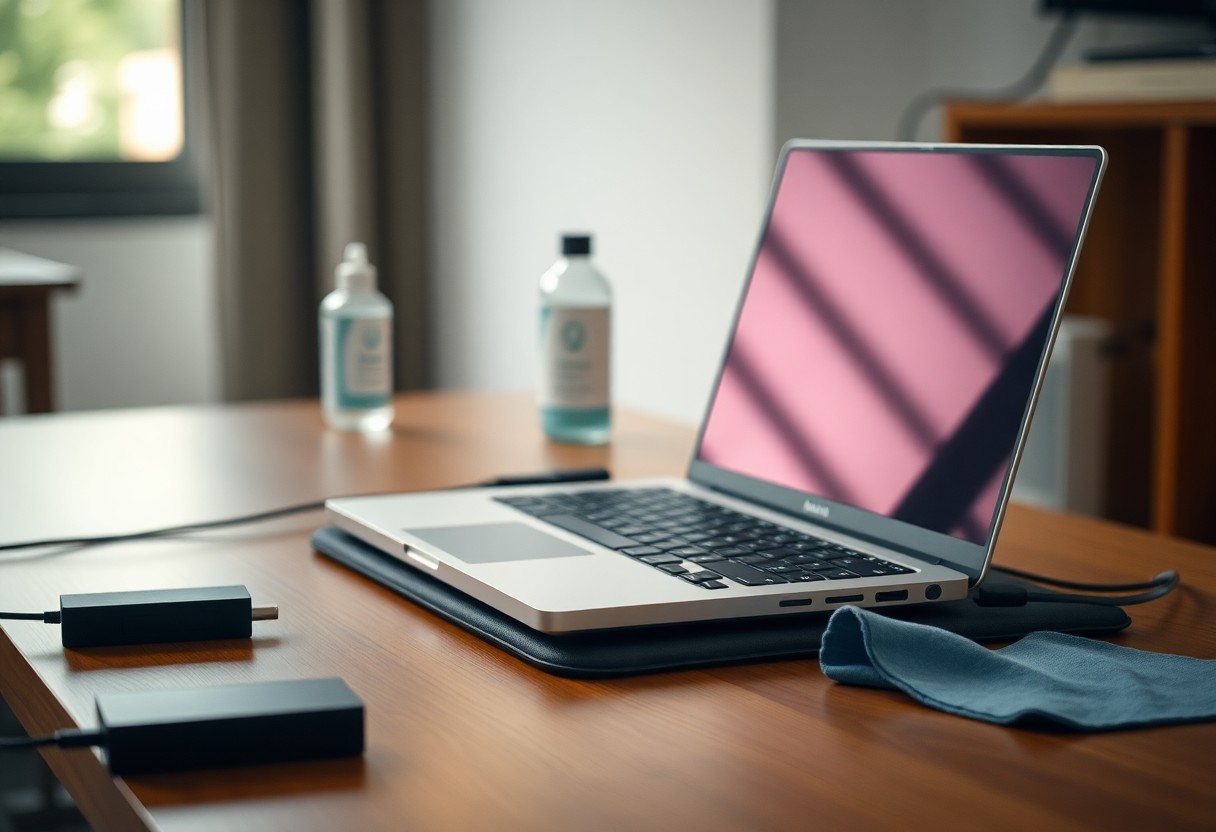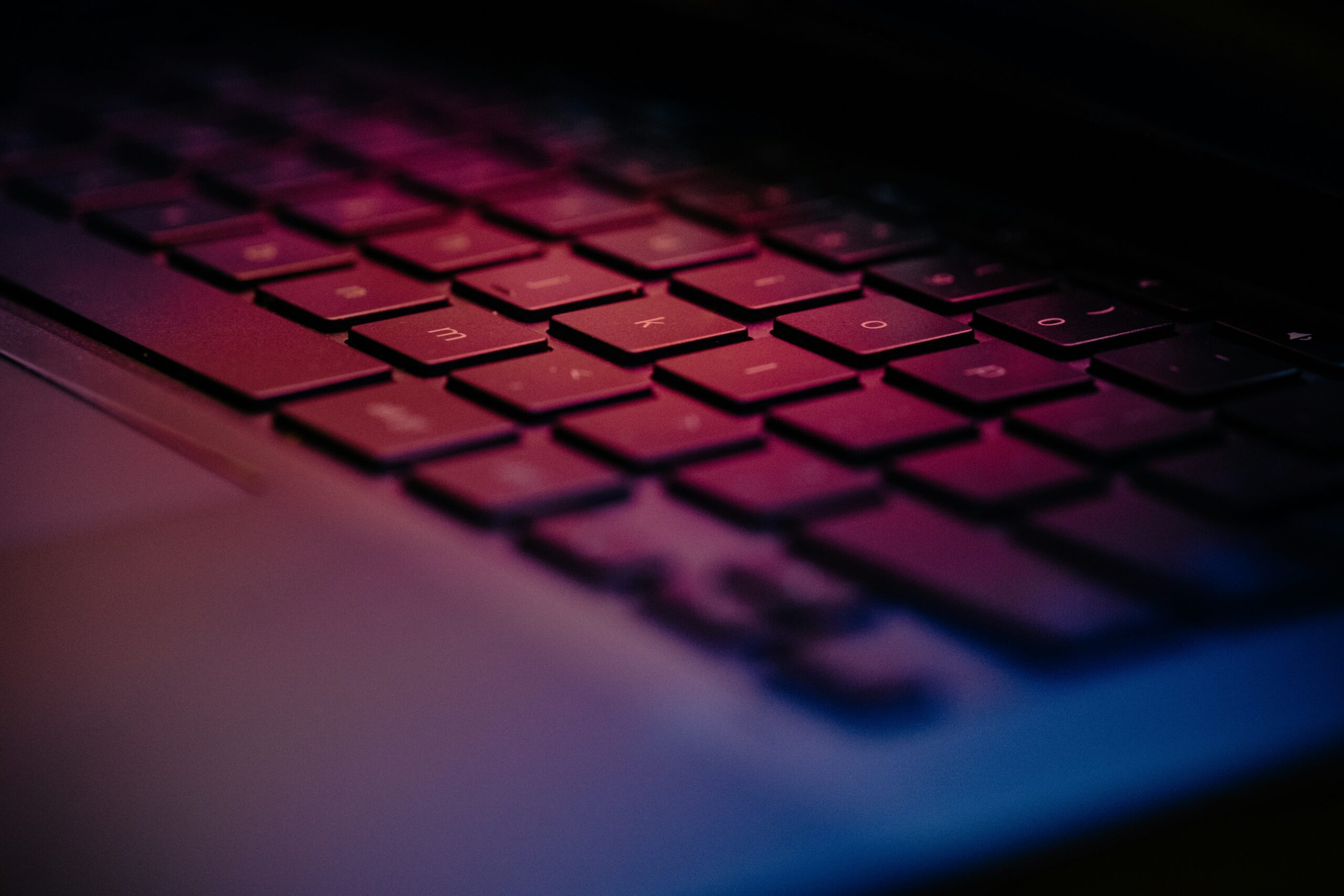Over time, your school laptop can face numerous challenges that may shorten its lifespan. However, by making a few simple adjustments, you can protect your investment and ensure it serves you well throughout your academic journey. This blog post will guide you through effective strategies, including proper maintenance techniques and usage habits, to maximize your laptop’s durability. Follow these tips to keep your device running smoothly and efficiently, avoiding common pitfalls that could lead to premature wear and tear.
Key Takeaways:
- Regularly clean your laptop’s exterior and keyboard to prevent dust and debris buildup, which can affect performance.
- Utilize a proper cooling pad to help maintain optimal temperatures during extended use, minimizing the risk of overheating.
- Be mindful of battery care by avoiding excessive charging cycles and unplugging the laptop once it reaches a full charge.
Proactive Maintenance Tips for Longevity
Implementing a routine maintenance schedule is fundamental to extending the life of your school laptop. Regularly perform the following tasks to ensure optimal performance:
- Clean the laptop’s exterior and keyboard
- Backup important files and data
- Monitor battery health
- Check for software vulnerabilities
This will help prevent issues before they arise and keep your laptop running smoothly.
Implementing Regular Software Updates
Keeping your laptop’s operating system and applications up to date is necessary for both safety and performance. Regular software updates not only introduce new features but also address necessary security vulnerabilities. By enabling automatic updates, you can ensure that your laptop receives the latest patches without needing to remember to do it manually.
Routine Hardware Checks
Performing routine hardware checks can identify potential problems before they escalate into serious issues. Look for signs of overheating, such as warm areas on your laptop’s surface or excessive fan noise. Inspect ports and connectors for any physical damage and ensure that components like the hard drive are functioning correctly. Check the battery’s status as well, and replace it if it shows signs of decay. Regular checks like these can provide peace of mind and prolong your laptop’s lifespan.
During these hardware checks, pay close attention to any unusual sounds or performance inconsistencies that might indicate hardware failure. For example, listen for grinding noises that could suggest a failing hard drive. Keep your laptop’s vents clean to prevent overheating, and consider using a cooling pad if you often use your laptop on soft surfaces like beds or couches. This proactive approach minimizes risks and keeps your device running efficiently for years to come.
Smart Usage Habits for Daily Life
Your daily usage habits play a significant role in extending the life of your school laptop. Incorporating mindful behaviors into your routine not only enhances performance but also prevents damage over the long term. Simple actions, such as using your laptop on hard, flat surfaces, can aid in maintaining optimal airflow and prevent damage from prolonged contact with soft materials. Additionally, practicing digital organization can streamline processes, minimizing excessive wear on your hardware.
Managing Power Settings for Efficiency
Tweaking your laptop’s power settings can greatly enhance efficiency and battery life. Choose a balanced power plan that automatically adjusts your screen brightness and puts the hard drive to sleep when not in use. Utilizing ‘Battery Saver’ mode during classes or when on the go is an effective way to conserve energy, ensuring you don’t run out of power unexpectedly.
Recognizing and Avoiding Overheating
Overheating can have devastating effects on your laptop’s lifespan and performance. Heat buildup often occurs during heavy usage or in poorly ventilated areas. To minimize this risk, ensure that your laptop’s vents are free from obstructions and regularly check for dust accumulation. Adequate airflow is necessary; aim to use your laptop on a flat, hard surface rather than on your bed or a couch, which can trap heat. Using a cooling pad is also an excellent investment to help keep your laptop cool during extended study sessions.
Protecting Your Device: Best Practices
Implementing best practices for protecting your school laptop is vital for longevity and performance. Simple habits can help safeguard your device against everyday wear and tear, ensuring that it remains functional for the duration of your studies. By investing in physical protection and adopting careful usage strategies, you can avoid costly repairs and replacements, letting you focus more on your work and less on your tech worries.
Utilizing Quality Cases and Screen Protectors
Opt for a sturdy laptop case designed for robust protection. A case acts as a shield against drops, spills, and scratches, while a quality screen protector can guard against scratches and cracks. Look for options that are specifically designed for your laptop model to ensure a perfect fit and maximum protection.
Strategies for Safe Transportation
Transporting your laptop securely is vital to preventing damage during commutes or trips between classes. Always place your device in a padded backpack or case to absorb shocks. Avoid stacking heavy items on top of your laptop; instead, store books and supplies in separate compartments. Keeping your laptop close to your body while walking can also minimize the risk of accidental drops.
Consider using a dedicated laptop compartment within your backpack to further cushion it during transport. If you’re riding a bicycle or walking briskly, hold your bag securely with both straps to stabilize it. Additionally, pause before setting your bag down; it’s safer to place it on a sturdy surface rather than precarious ledges. Adopting these small habits can significantly enhance your laptop’s safety, naturally leading you to worry less about potential damages.
Storage Solutions: Maximizing Performance
Optimizing storage solutions significantly enhances your laptop’s performance. Keeping your disk space neat and organized can prevent slowdowns and allow for a smoother user experience. Utilize built-in tools and software to routinely check for large or unnecessary files, and don’t hesitate to delete or transfer them to a more suitable storage method, ensuring your system runs at its best capability.
Managing Disk Space and File Organization
Regularly managing your disk space is key to ensuring that your laptop continues to perform efficiently. Create a structured file organization system that allows you to easily access important documents while minimizing clutter. Invest time in sorting files into specific folders and routinely assess what can be archived or deleted to free up space on your hard drive.
Cloud Storage as a Lifeline
Utilizing cloud storage services can be a game-changer for managing your school laptop’s storage needs. Not only does it provide a safe backup for your important documents, but it also frees up significant disk space by allowing you to store files online. Services like Google Drive or Dropbox offer a range of storage options, enabling you to access your files from anywhere with internet connectivity.
With cloud storage, you can effortlessly manage your files across multiple devices without bogging down your laptop’s storage capacity. By offloading larger projects and files to the cloud, you can optimize performance and ensure your laptop operates smoothly for your day-to-day needs. Schools often provide free access to specific platforms, so take advantage of these resources to enhance your organizational capabilities and safeguard your important documents.
Troubleshooting Techniques to Prevent Downtime
Preventing downtime means recognizing potential issues before they escalate. Regularly monitoring your laptop’s performance, such as slow boot times or unexpected crashes, can help you address problems early. Simple interventions like updating software, running antivirus scans, and checking for malware can keep your device running smoothly. Familiarize yourself with your laptop’s built-in diagnostic tools, which can provide valuable insights into overall health and function.
Recognizing Early Warning Signs of Issues
Paying attention to early warning signs is key to maintaining your laptop’s health. Unusual noises, excessive heat, or a significantly slower response time can all indicate underlying problems. Additionally, if your laptop frequently freezes or shows error messages, these are signals that troubleshooting is needed. Catching these symptoms early can save you both time and money by preventing more serious issues down the line.
When and How to Seek Professional Help
Don’t hesitate to seek professional assistance if you notice persistent issues that you can’t resolve. If you’ve tried troubleshooting methods and the problems continue, consult with your school’s IT department or a certified technician. They can provide a more thorough examination and necessary repairs, ensuring that your laptop receives the needed expertise to restore optimal performance.
While DIY solutions are often effective, knowing when to reach out for help protects your investment. If routine fixes like software updates or virus scans fail to improve your device’s performance, bring it to a professional. Communicating specific problems and any steps you’ve already taken can lead to quicker diagnostics and repairs. This proactive approach minimizes downtime, maximizes productivity, and extends the lifespan of your school laptop.
To wrap up
Drawing together these practical strategies will significantly enhance the lifespan of your school laptop. By regularly cleaning your device, managing its storage, and using energy-saving settings, you can ensure optimal performance and durability. Additionally, being mindful of how you transport and store your laptop can prevent unnecessary damage. Implementing these simple, yet effective tips will not only save you money in the long run but also keep your device running smoothly for all your academic needs.
FAQ
Q: What are some effective ways to clean my school laptop safely?
A: Cleaning your school laptop regularly can significantly extend its life. Start by turning off the laptop and unplugging it. Use a microfiber cloth slightly dampened with water or a gentle cleaning solution designed for electronics. Wipe the keyboard, screen, and casing to remove dust and grime. For tight spaces, like between keys, a can of compressed air can dislodge debris. Avoid using harsh chemicals or excessive moisture to protect the components.
Q: How can I optimize my laptop’s performance to ensure longevity?
A: Keeping your laptop running smoothly is vital for its lifespan. Start by regularly updating your operating system and software to benefit from the latest performance improvements. Remove unnecessary applications and files to free up space. Consider defragmenting your hard drive if applicable or utilizing disk cleanup tools to manage storage better. Additionally, using power-saving modes when not plugged in can help reduce wear on the battery.
Q: What are the best practices for charging my laptop to enhance battery health?
A: To improve your laptop’s battery life, avoid leaving it plugged in all the time. Instead, aim to keep the battery level between 20% and 80%. If possible, unplug it once it reaches 100% and only recharge when it drops to around 20%. Regularly cycling the battery by using it on battery power and then charging it promotes healthy charge cycles. Additionally, make sure to use the charger that came with your laptop or a compatible one to prevent damage.



